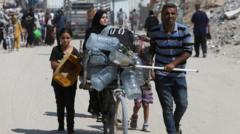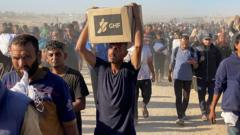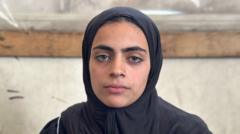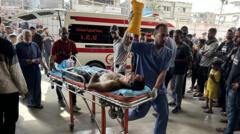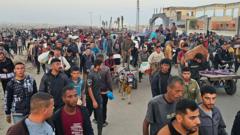Amid a devastating war, pregnant women in Gaza are battling malnutrition and lack of medical care, leading to increased risks for mothers and newborns. Families are torn apart by tragedy as many children face life-threatening conditions without adequate support.
"Pregnancy in Gaza: A Fight for Survival Amidst War"
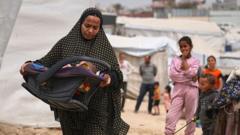
"Pregnancy in Gaza: A Fight for Survival Amidst War"
The harsh realities of pregnancy and childbirth in Gaza take a heartbreaking turn as expectant mothers face malnutrition, trauma, and overwhelming fear during ongoing conflict.
In Gaza, pregnancy and childbirth have transformed into periods fraught with dread and sorrow. As conflict rages, newborns and expectant mothers bear the brunt of the unfurling humanitarian crisis. The United Nations estimates that food shortages mean one in ten newborns is born either underweight or prematurely, with alarming rises in miscarriages and stillbirths being reported. Malak Brees, a seven-month-pregnant woman, expresses her fears of losing her child to the violence and the severe lack of medical care, stating: "I’m frightened that I could have a premature birth at any time."
The dire circumstances faced by mothers are compounded by a total blockade imposed by Israel, limiting access to essential medical supplies and basic nutritional needs. Women often find themselves giving birth under inadequate conditions, sometimes in tents with little to no medical assistance. Sandra Adler Killen, an emergency nurse who volunteered in Gaza, shares the grim reality: "Women who have had surgical C-sections are discharged after 24 hours... with babies who have conditions that would in normal circumstances require more hospital support."
Tragic stories abound as healthcare facilities become overwhelmed. The recent bombardment of the European hospital has pushed more patients to Nasser Hospital, which is the only facility still able to provide intensive neonatal care. Pregnant women now often lack access to proper pre-natal check-ups, leaving many terrified of the complications their newborns may face. Dr. Ahmad al-Farra painfully notes, "The psychological state of the women at the point of childbirth is heartbreaking."
Mothers are also devastated by grief as they watch their babies suffer from malnutrition and untreated medical issues. Aya al-Skafi recalls the harrowing loss of her four-month-old daughter, Jenan, due to a lack of available special formula. "I begged for help but only God answered," she says, encapsulating the desperate pleas of countless families.
The Gaza Infant Nutrition Alliance is working to provide support as lactation specialists teach mothers to breastfeed even in difficult conditions, stressing that dependency on formula can lead to dire consequences. Many mothers still struggle due to their own poor health, exacerbated by fear of continued violence and shortages.
In a story that illustrates the tragedies faced by families, Jomana Arafa, who recently gave birth to twins, was killed along with her newborns in an Israeli airstrike, a moment that shattered her community. Stories of mothers losing their lives, their newborns, and their families are rife, leaving the remaining mothers engulfed in despair.
As war continues, the perception of childbirth shifts from a hopeful beginning to a stark struggle for survival. The plight of women in Gaza remains a glaring testament to the profound impact of war on everyday lives, where the joy of new life is overshadowed by fear and trauma.













